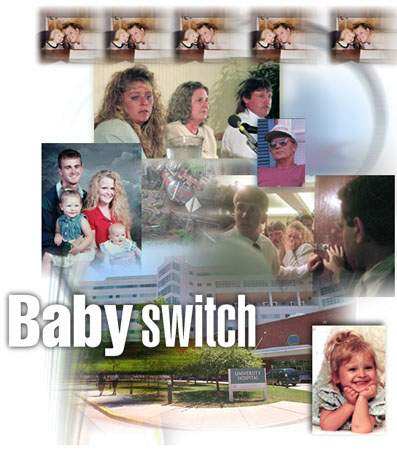
Photos from the Virginia Switched Babies Case
Rebecca Chittum has been living with her grandparents for a month, since a car crash killed Tamara Whitney Rogers, the woman she knew as her mother. The woman's fiancee also died.
Tommy Rogers and his wife had first balked at having the girl undergo genetic testing, unsure whether they wanted to learn their granddaughter may have been conceived by strangers.
 Photos from the Virginia Switched Babies Case |
"It's going to come back that Rebecca is going to be ours," Rogers told The Daily Progress of Charlottesville for a story published today. Rogers further indicated that he does not believe that his granddaughter was switched, and that he believes that Rebecca is his biological granddaughter.
Paula Johnson, the woman who has been raising the other blond girl, discovered last month after DNA testing for a paternity suit that Callie, the baby she took home from the University of Virginia Hospital, was not her own.
No matter what the blood tests show, Ms. Johnson said Wednesday, she believes the girls should remain with the families that raised them.
"It's the only thing they've ever known,'' Johnson said. "I don't see me changing my mind about taking her away from these people."
Hospital officials now believe the Rogerses' daughter, Tamara, and her fiancee, Kevin Chittum, took home Ms. Johnson's baby in June 1995, while she took theirs.
A review by the hospital of blood samples taken from the girls, born hours apart, indicated that Rebecca probably was Paula Johnson's biological daughter.
Rebecca's medical record at the hospital listed her blood type as A-positive. But a blood test taken last month showed her blood type as O-negative, USA Today reported. When Callie was tested last month, her blood type was A-positive.
Tests of DNA, the genetic code inherited from parents, prove more conclusively than blood-type tests whether or not two people are related.
The blood sample previously taken from Rebecca will be tested at a state lab in Fairfax, and the result is expected by Monday, said the Rogerses' lawyer, Pete Robey.
Ms. Johnson's lawyer, Cynthia Johnson, did not return phone calls seeking comment Wednesday. The lawyer and her client are not related.
At a news conference, Ms. Johnson fought back tears Tuesday and said she would accept whatever scenario the families, psychiatrists and lawyers settled on in the girls' best interest.
Her lawyer said Tuesday that she hadn't decided whether or not to sue the hospital.
"Money can't change the fact that my child was switched," said the construction company employee, who has three other children and custody of another.
State and university police are investigating the switch, which they believe could not have been accidental.